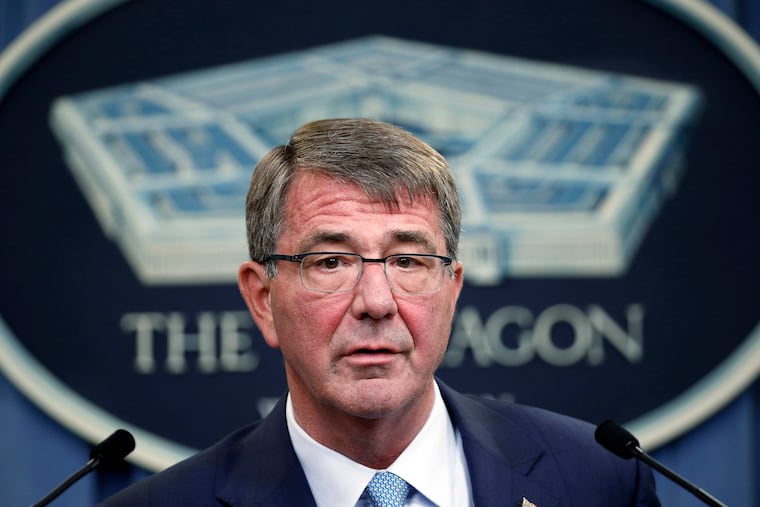Ashton Carter, former defense secretary and Montco native, has died at 68
Long before Yale, Oxford, and Washington, Ash Carter was a legend in Abington Township.

Ashton B. “Ash” Carter, 68, the Abington Township native who as defense secretary removed barriers that prevented women from serving in combat and opened the military to transgender people, died late Monday of a heart attack in Boston, his family announced Tuesday.
“Mr. Carter was a man of extraordinary integrity,” President Joe Biden said in a statement, “guided by a strong, steady moral.”
Former President Barack Obama, who appointed Mr. Carter to the cabinet position he held for two years, called him “a leader who left America — and the world — safer through his lifetime of service.”
Mr. Carter served as director of the Belfer Center for Science and International Affairs at Harvard University’s Kennedy School after leaving the defense secretary role in January 2017.
It had been quite an eventful two years in Washington. In December 2015, Mr. Carter ordered that all military jobs, including combat roles, be open to women.
Six months later, Mr. Carter ended the ban on transgender troops serving in the U.S. military. “Americans who want to serve and can meet our standards should be afforded the opportunity to compete to do so,” Mr. Carter said in June 2016.
John Gans, who worked with Mr. Carter for several years as a speechwriter, said he doubted if anyone other than Mr. Carter could have persuaded the Pentagon to make that decision. Describing Mr. Carter as profoundly nonpolitical and a person of “otherworldly intelligence,” he said that Mr. Carter’s argument for the policy change was “truly driven by logic.”
Biden recalled that under the radar, Mr. Carter and his wife, Stephanie, would visit wounded members of the military at Walter Reed Hospital. “He did so out of the spotlight, demonstrating the personal integrity and sense of duty that distinguished him throughout his life,” Biden said.
Gans said: “He went to the hospitals. He met with people who lost their limbs. He knew the tolls.
“He took deeply seriously the job of security. He used to say security is like oxygen, and you don’t really know what it’s like to not have it until you don’t.”
Gans said that during Mr. Carter’s 35-year government career, he was an important behind-the-curtains influence on U.S. policy, and argued persuasively against partnerships with Russia.
Gen. Martin Dempsey, former chairman of the Joint Chiefs of Staff, once called Mr. Carter the “most important, least-known figure in Washington.”
When he announced Mr. Carter’s appointment to the cabinet, Obama joked that Mr. Carter, who had served under 11 defense secretaries, was so smart, “he’s one of the few people who actually understands how many of our defense systems work.”
According to his Harvard autobiographical sketch, Mr. Carter studied physics and medieval history at Yale University. He wrote a senior thesis on the use of Latin by monastic writers to describe 12th-century Flanders and on the “charmed quark.” Later, he earned a doctorate in theoretical physics as a Rhodes scholar at Oxford.
Aside from all that, according to Obama, Mr. Carter loved Motown music.
Long before Mr. Carter found his way to Yale, to Oxford, to Washington, to Harvard, and became known universally as “Ash,” he was “Ashton,” a local legend and a member of the Abington High School Hall of Fame.
“He took pride in being a Philly kid,” said Gans, a Delaware County native.
A 1972 graduate, he was president of the honor society, a class councilman, cross-country runner, wrestler, and lacrosse player. In an era when many Abington classmates had long, shaggy hair and preferred bell bottoms, Mr. Carter was clean-cut, with short hair and collared shirts.
Mr. Carter was a “truly remarkable human being,” said Angelo Berrios, the Abington High principal who met him several years ago. “All of us are feeling the gravity of this news.”
Mr. Carter wrote in that autobiographical essay that attending a large public high school, all of his extracurricular activities, and a few part-time jobs left him “intellectually hungry,” with little time “to do the reading and research that I was craving.”
Mr. Carter was born in Philadelphia, his father a neurologist.
Ash Carter was raised on Wheatsheaf Lane in Abington and attended Highland Elementary School. A grade-school classmate recalled the time his father took him to a swimming pool, and Mr. Carter also happened to be there; they both were about 10.
The classmate recalled thinking, “To me, he was a regular kid.
“But I remember my dad said to my mom at the time, ‘This kid is really sharp.’“
Berrios said, “What impressed most was his willingness to give back.” Berrios recalled how Mr. Carter, who visited the school for a program in March 2015, made time to mentor students, spending a half hour on the phone with one student who was interested in majoring in physics in college.
“With such a demanding schedule he still found time to talk to some of our students,” Berrios said.
Abington students evidently weren’t the only ones who benefited from his counsel .
“Ash’s greatest legacy,” said Obama, “may be the generations of younger leaders he taught, mentored, and inspired to protect our nation and wield power wisely. "
Mr. Carter is survived by his wife and two children. Information on funeral services was unavailable.
Staff writers Michaelle Bond and Jonathan Tamari contributed to this article, which contains information from the Associated Press.